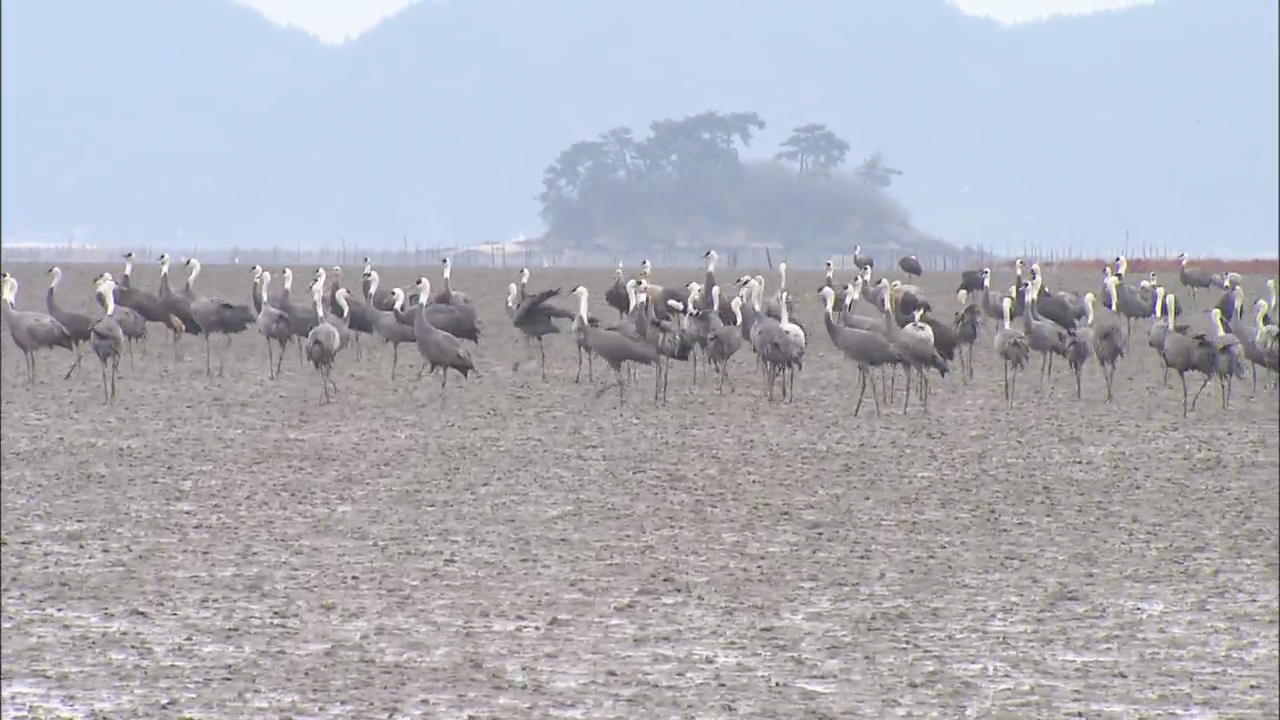Avian Influenza
입력 2019.03.11 (15:17)
수정 2019.03.11 (15:31)
읽어주기 기능은 크롬기반의
브라우저에서만 사용하실 수 있습니다.
[Anchor Lead]
Korean poultry farms luckily managed to avoid avian influenza last winter. But migratory birds in Korea are increasingly being blamed for spreading the deadly virus.
[Pkg]
This migratory bird observatory tower by the Geumgang River used to be visited by hundreds of thousands of tourists every year. But lately their numbers have plunged due to avian influenza outbreaks in the past several years. A migratory bird festival that had been held for 15 years was also suspended this year. The situation is similar at the Suncheonman Bay and the Junam Reservoir in Changwon, which are visited by hooded cranes. Frequent outbreaks of avian influenza have forced authorities to scale down bird-watching programs and have dealt a blow to local vendors as well.
[Soundbite] Shin Young-ah(Staff at nearby restaurant) : "We can only work 10-15 days a month."
A growing number of tourists and livestock farms view migratory birds as unwelcome guests that spread the bird flu virus. However, experts say that although migratory birds can indeed spread avian influenza, the virus mostly spreads on poultry farms due to loopholes in quarantine measures.
[Soundbite] Kim Young-jun(National Inst. of Ecology) : "The spread of avian influenza on farms must be viewed separately from the issue of migratory birds in Korea."
In Izumi, Japan, where hooded cranes spend the winter, the local migratory bird observation centers are never closed down even when there are outbreaks of highly pathogenic avian influenza. Instead, local farms make sure to disinfect their facilities thoroughly and take preventative measures. There's a call for understanding that migratory birds are not unwelcome guests that spread the avian virus, but a part of nature that must coexist with humans.
Korean poultry farms luckily managed to avoid avian influenza last winter. But migratory birds in Korea are increasingly being blamed for spreading the deadly virus.
[Pkg]
This migratory bird observatory tower by the Geumgang River used to be visited by hundreds of thousands of tourists every year. But lately their numbers have plunged due to avian influenza outbreaks in the past several years. A migratory bird festival that had been held for 15 years was also suspended this year. The situation is similar at the Suncheonman Bay and the Junam Reservoir in Changwon, which are visited by hooded cranes. Frequent outbreaks of avian influenza have forced authorities to scale down bird-watching programs and have dealt a blow to local vendors as well.
[Soundbite] Shin Young-ah(Staff at nearby restaurant) : "We can only work 10-15 days a month."
A growing number of tourists and livestock farms view migratory birds as unwelcome guests that spread the bird flu virus. However, experts say that although migratory birds can indeed spread avian influenza, the virus mostly spreads on poultry farms due to loopholes in quarantine measures.
[Soundbite] Kim Young-jun(National Inst. of Ecology) : "The spread of avian influenza on farms must be viewed separately from the issue of migratory birds in Korea."
In Izumi, Japan, where hooded cranes spend the winter, the local migratory bird observation centers are never closed down even when there are outbreaks of highly pathogenic avian influenza. Instead, local farms make sure to disinfect their facilities thoroughly and take preventative measures. There's a call for understanding that migratory birds are not unwelcome guests that spread the avian virus, but a part of nature that must coexist with humans.
■ 제보하기
▷ 카카오톡 : 'KBS제보' 검색, 채널 추가
▷ 전화 : 02-781-1234, 4444
▷ 이메일 : kbs1234@kbs.co.kr
▷ 유튜브, 네이버, 카카오에서도 KBS뉴스를 구독해주세요!
- Avian Influenza
-
- 입력 2019-03-11 15:23:46
- 수정2019-03-11 15:31:25

[Anchor Lead]
Korean poultry farms luckily managed to avoid avian influenza last winter. But migratory birds in Korea are increasingly being blamed for spreading the deadly virus.
[Pkg]
This migratory bird observatory tower by the Geumgang River used to be visited by hundreds of thousands of tourists every year. But lately their numbers have plunged due to avian influenza outbreaks in the past several years. A migratory bird festival that had been held for 15 years was also suspended this year. The situation is similar at the Suncheonman Bay and the Junam Reservoir in Changwon, which are visited by hooded cranes. Frequent outbreaks of avian influenza have forced authorities to scale down bird-watching programs and have dealt a blow to local vendors as well.
[Soundbite] Shin Young-ah(Staff at nearby restaurant) : "We can only work 10-15 days a month."
A growing number of tourists and livestock farms view migratory birds as unwelcome guests that spread the bird flu virus. However, experts say that although migratory birds can indeed spread avian influenza, the virus mostly spreads on poultry farms due to loopholes in quarantine measures.
[Soundbite] Kim Young-jun(National Inst. of Ecology) : "The spread of avian influenza on farms must be viewed separately from the issue of migratory birds in Korea."
In Izumi, Japan, where hooded cranes spend the winter, the local migratory bird observation centers are never closed down even when there are outbreaks of highly pathogenic avian influenza. Instead, local farms make sure to disinfect their facilities thoroughly and take preventative measures. There's a call for understanding that migratory birds are not unwelcome guests that spread the avian virus, but a part of nature that must coexist with humans.
Korean poultry farms luckily managed to avoid avian influenza last winter. But migratory birds in Korea are increasingly being blamed for spreading the deadly virus.
[Pkg]
This migratory bird observatory tower by the Geumgang River used to be visited by hundreds of thousands of tourists every year. But lately their numbers have plunged due to avian influenza outbreaks in the past several years. A migratory bird festival that had been held for 15 years was also suspended this year. The situation is similar at the Suncheonman Bay and the Junam Reservoir in Changwon, which are visited by hooded cranes. Frequent outbreaks of avian influenza have forced authorities to scale down bird-watching programs and have dealt a blow to local vendors as well.
[Soundbite] Shin Young-ah(Staff at nearby restaurant) : "We can only work 10-15 days a month."
A growing number of tourists and livestock farms view migratory birds as unwelcome guests that spread the bird flu virus. However, experts say that although migratory birds can indeed spread avian influenza, the virus mostly spreads on poultry farms due to loopholes in quarantine measures.
[Soundbite] Kim Young-jun(National Inst. of Ecology) : "The spread of avian influenza on farms must be viewed separately from the issue of migratory birds in Korea."
In Izumi, Japan, where hooded cranes spend the winter, the local migratory bird observation centers are never closed down even when there are outbreaks of highly pathogenic avian influenza. Instead, local farms make sure to disinfect their facilities thoroughly and take preventative measures. There's a call for understanding that migratory birds are not unwelcome guests that spread the avian virus, but a part of nature that must coexist with humans.
이 기사가 좋으셨다면
-
좋아요
0
-
응원해요
0
-
후속 원해요
0

















이 기사에 대한 의견을 남겨주세요.